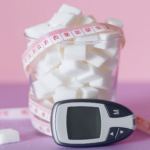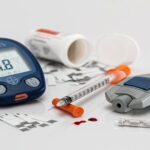In a world where diabetes affects millions, finding complementary ways to support health is more important than ever. Black seed oil, derived from the seeds of the Nigella sativa plant (also known as black cumin), has emerged as a topic of growing interest in scientific research. Traditionally used in various cultures for centuries, modern studies suggest it […]
WHO advises not to use non-sugar sweeteners for weight control
The World Health Organization (WHO) has released a new guideline on non-sugar sweeteners (NSS), which recommends against the use of NSS to control body weight or reduce the risk of noncommunicable diseases (NCDs). The recommendation is based on the findings of a systematic review of the available evidence which suggests that use of NSS does […]
Devil in the Milk: Illness, Health and the Politics of A1 and A2 Milk
This groundbreaking work is the first internationally published book to examine the link between a protein in the milk we drink and a range of serious illnesses, including heart disease, Type 1 diabetes, autism, and schizophrenia. These health problems are linked to a tiny protein fragment that is formed when we digest A1 beta-casein, a […]
Diabetic foot amputations avoided with silver nanoparticles
One of the major complications of diabetes is the appearance of wounds in the lower extremities that do not heal properly. In this situation, a group of researchers from the UNAM created a solution made of silver nanoparticles, which in clinical trials has healed ulcers people with diabetic foot, avoiding the amputation of more than […]
New processing technique could make potatoes healthier
Researchers announced early tests of a new potato processing technique designed to make our bodies digest potato starch more slowly. Laboratory demonstrations show that the approach blocks certain digestive enzymes from reaching the potato starch as quickly, leading to a more controlled release of dietary glucose. “There is a perception that potato foods are unhealthy […]
Common flame retardants cause mice to give birth to offspring that become diabetic
A new UC Riverside study shows flame retardants found in nearly every American home cause mice to give birth to offspring that become diabetic. These flame retardants, called PBDEs, have been associated with diabetes in adult humans. This study demonstrates that PBDEs cause diabetes in mice only exposed to the chemical through their mothers. “The […]
How sweet it is: Artificial sweeteners in blood
A recent study by investigators at the National Institute of Diabetes, Digestive and Kidney Diseases at the National Institutes of Health measured how much artificial sweetener is absorbed into the blood stream by children and adults after drinking a can of diet soda. Results of this study are published in Toxicological & Environmental Chemistry. The team […]
Certain pre-existing conditions may double, triple mortality risk for COVID-19
A large, international study of COVID-19 patients confirmed that cardiovascular disease, hypertension, diabetes, congestive heart failure, chronic kidney disease, stroke and cancer can increase a patient’s risk of dying from the virus. Penn State College of Medicine researchers say their findings may help public health officials improve patient care and develop interventions that can target […]
Drinking green tea and coffee daily linked to lower death risk in people with diabetes
Drinking plenty of both green tea and coffee is linked to a lower risk of dying from any cause among people with type 2 diabetes, suggests research published in the online journal BMJ Open Diabetes Research & Care. Drinking 4 or more daily cups of green tea plus 2 or more of coffee was associated with […]
Why zero-calorie sweeteners can still lead to diabetes, obesity
Increased awareness of the health consequences of eating too much sugar has fueled a dramatic uptick in the consumption of zero-calorie artificial sweeteners in recent decades. However, new research finds sugar replacements can also cause health changes that are linked with diabetes and obesity, suggesting that switching from regular to diet soda may be a […]









